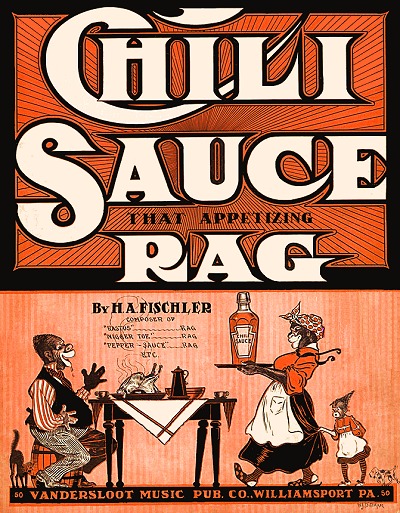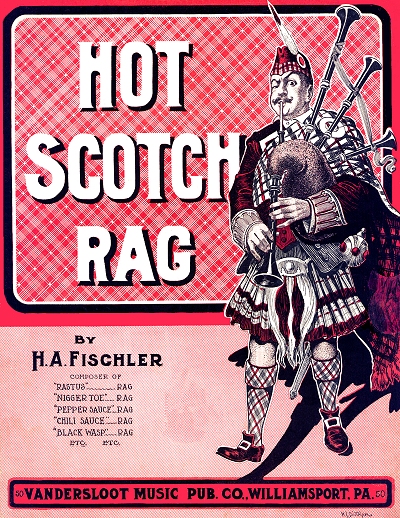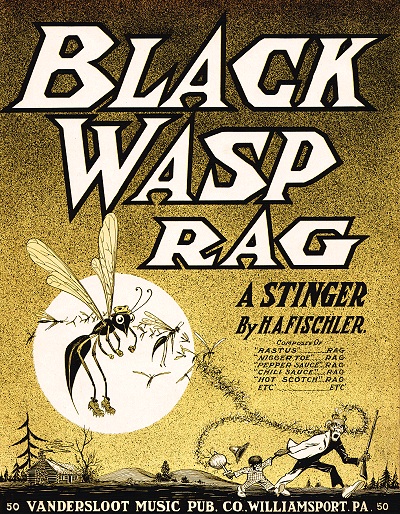 Harry Augustus Fischler August 23, 1879 to June 17, 1959 | |
 Compositions Compositions | |
|
1905
Ragged Rastus1909
Rastus: Rag [likely Ragged Rastus]1910
Some Day Some One Will Whisper"I Love You" My Old Plantation Home: Quartet Chili-Sauce Chili-Sauce Song Pepper Sauce - A Hot Rag Nigger-Toe Rag |
1911
Hot Scotch RagBlack Wasp Rag – A Stinger Weeping Willow Rag 1914
Keefer's Grenadier: March1916
When Yo Mammy's By Yo Side(A Negro Lullaby) When the Summer Days are Over Will You Love Me Just the Same? |
Harry A. Fischler was born in Wellsboro, Pennsylvania to German immigrant parents Frank R. Fischler and Rosena Sticklin, who were among many that had settled in central Pennsylvania during the mid-19th century. He had three step-siblings from his father’s first marriage to Louise Fischler, including Ernest Mortimer (3/2/1866), Louise (1868), and Eva Louise. (12/1872), as well as three siblings from his own mother, Lillian Louise (3/1/1877) Frank Lewis (3/15/1877) and Lula (12/7/1880). The year of birth shown for Harry varies between 1879 or 1880 depending on which records are accessed. The 1900 census shows 1879 as his birth, as does his World War I draft record. However, records from the 1910s forward including his World War II draft record indicate 1880. That he appeared in the June 1880 enumeration as 9 months in age and that his younger sister Lula was born in 1880 confirms an 1879 birth year, which will be assumed for this essay.
That he appeared in the June 1880 enumeration as 9 months in age and that his younger sister Lula was born in 1880 confirms an 1879 birth year, which will be assumed for this essay.
 That he appeared in the June 1880 enumeration as 9 months in age and that his younger sister Lula was born in 1880 confirms an 1879 birth year, which will be assumed for this essay.
That he appeared in the June 1880 enumeration as 9 months in age and that his younger sister Lula was born in 1880 confirms an 1879 birth year, which will be assumed for this essay.Harry's father was a grocer in Wellsboro. A January 1882 advertisement in the Wellsboro Agitator states that "Frank R. Fischler... had bought out the interest of Mr. Andrew J. Tipple in the Wellsboro Meat Market, and will hereafter conduct the business in such a manner as to merit the confidence and patronage of the public." It was both in Wellsboro and nearby Williamsport that documents from as early as 1892 offer the likelihood of Harry as a potential eventual member of the Stopper and Fisk Orchestra founded in 1877. The leader was one Charles Fischler, and the orchestra also listed a second or "annex" orchestra, usually a staple of many groups so they could cover two performances on the same evening and still have money coming into the same pot. He spent his days as a piano tuner as well. Other members included John Fischler, Jr., Frank Fischler, Edwin Fischler, Ernest Fischler and Peter Fischler. They were relatives of the Wellsboro Fischlers, so Charles may have given Harry his first musical break before he even reached adulthood. The first indications of this come from an article referencing a 1897 engagement of a band that Harry had formed, the Wellsboro Quartette, mentioned in a June 1900 article in the Agitator. There was also mention of a 1901 engagement of Harry with the Stopper and Fisk Orchestra, usually accompanied with good reviews of his performances. The 1900 census showed Harry working as a clerk, possibly in his father's grocery store, as his brother Frank was working there as a butcher. Harry left for Williamsport, Pennsylvania in the summer of 1901 at age 22.
In late 1903, 24-year-old Harry was married to 19-year-old Beulah Evelyn Neece. The couple lived variously in Williamsport, or the Loyalsock Township, Pennsylvania, at the same house address. They had three children, the first one being Harry M. born September 5, 1904, followed by Evelyn Beulah on July 22, 1906. There was also one daughter born in early 1909 who died during infancy in September of that same year. Harry was listed as an orchestra musician in the 1910 census, shortly after his first pieces were published by Vandersloot Music Publishing Company in Williamsport. This occupation would likely include his role in the Stopper and Fisk organization, but may have also referenced engagements he had with the renowned Repasz Band and the Wellsboro Military Band, both of which he had worked with, or even his roles as solo pianist, cornetist or accompanist for local performers.
This occupation would likely include his role in the Stopper and Fisk organization, but may have also referenced engagements he had with the renowned Repasz Band and the Wellsboro Military Band, both of which he had worked with, or even his roles as solo pianist, cornetist or accompanist for local performers.
 This occupation would likely include his role in the Stopper and Fisk organization, but may have also referenced engagements he had with the renowned Repasz Band and the Wellsboro Military Band, both of which he had worked with, or even his roles as solo pianist, cornetist or accompanist for local performers.
This occupation would likely include his role in the Stopper and Fisk organization, but may have also referenced engagements he had with the renowned Repasz Band and the Wellsboro Military Band, both of which he had worked with, or even his roles as solo pianist, cornetist or accompanist for local performers.Harry most often played cornet in the ensembles. Some sources have incorrectly cited Fischler as a pseudonym of Harry J. Lincoln, the composer and general manager of Vandersloot Music. This may be in part because he was also published as H.A. Fischler, never using his full first or middle name, including his first work, Ragged Rastus, initially published in Chicago in 1905 by Pioneer Music. Yet his name did show up in copyright records, and also the local newspapers. A July 22, 1914 article in the Williamsport Gazette and Bulletin reviewed a recent concert in which:
Every number was good with several standing out pre-eminently. It opened with a rattling march, "Keefer's Grenadier," by Harry Fischler. This march was well received, and was enjoyed by everyone. It is brand new and last night was its first rendition, but it gives promise of being extremely popular. Mr. Fischler has dedicated it to Bura C. Keefer.
As further proof of his not being Lincoln, his final two songs were published by Star Music in Eldred, Pennsylvania, not by Vandersloot. Newspaper reports in Wellsboro through the 1900s, 1910s and 1920s indicate several visits of Harry to his parents and other relatives in that town. He evidently participated in a yearly inventory of his father's market each January, as noted in several mentions in the Wellsboro papers. Subsequent census records and articles keep Fischler in the music business as a music teacher in 1920, and a salesman for the Imperial Band Instrument Company from the 1920s through the early 1930s. In 1922 he was appointed as the secretary of the company. Fischler was also a music and orchestra director at St. Luke's Lutheran Church. Son Harry M. Fischler died of pneumonia on March 1, 1933, living in Oklahoma and managing a Woolworth's store. Harry's parents both passed on in the late 1930s. The 1940 census showed the couple and Evelyn living in the same home at 1321 Cherry Street in Williamsport, with Harry working as a music teacher and Evelyn as a high school teacher.
Subsequent census records and articles keep Fischler in the music business as a music teacher in 1920, and a salesman for the Imperial Band Instrument Company from the 1920s through the early 1930s. In 1922 he was appointed as the secretary of the company. Fischler was also a music and orchestra director at St. Luke's Lutheran Church. Son Harry M. Fischler died of pneumonia on March 1, 1933, living in Oklahoma and managing a Woolworth's store. Harry's parents both passed on in the late 1930s. The 1940 census showed the couple and Evelyn living in the same home at 1321 Cherry Street in Williamsport, with Harry working as a music teacher and Evelyn as a high school teacher.
 Subsequent census records and articles keep Fischler in the music business as a music teacher in 1920, and a salesman for the Imperial Band Instrument Company from the 1920s through the early 1930s. In 1922 he was appointed as the secretary of the company. Fischler was also a music and orchestra director at St. Luke's Lutheran Church. Son Harry M. Fischler died of pneumonia on March 1, 1933, living in Oklahoma and managing a Woolworth's store. Harry's parents both passed on in the late 1930s. The 1940 census showed the couple and Evelyn living in the same home at 1321 Cherry Street in Williamsport, with Harry working as a music teacher and Evelyn as a high school teacher.
Subsequent census records and articles keep Fischler in the music business as a music teacher in 1920, and a salesman for the Imperial Band Instrument Company from the 1920s through the early 1930s. In 1922 he was appointed as the secretary of the company. Fischler was also a music and orchestra director at St. Luke's Lutheran Church. Son Harry M. Fischler died of pneumonia on March 1, 1933, living in Oklahoma and managing a Woolworth's store. Harry's parents both passed on in the late 1930s. The 1940 census showed the couple and Evelyn living in the same home at 1321 Cherry Street in Williamsport, with Harry working as a music teacher and Evelyn as a high school teacher.Harry's 1942 draft record showed him as a "Band Instructor - specializing in trumpet & cornet teaching." It also cited a disability with his left leg, requiring the use of crutches. His civic role changed a bit during the war, as in August 1942 Harry was appointed the "city sealer of weights and measures" for Williamsport, continuing in this role into the mid-1950s. He also turned into a poet, having a poem, I'd Like to Go A Fishin', published on the cover of Pennsylvania Angler in late 1945. Beulah was also visibly involved with the local G.O.P. organization, and was often mentioned as having organized the music for their events. According to his obituary, Harry was very integral to many organizations in the area. These included being a member of St. Luke’s Lutheran Church, where he directed the orchestra there for many years. Also, a life member of Lodge 106 Free & Accepted Masons, Lycoming Royal Arch Chapter 222, Baldwin II Commandery No. 22, Knights Templar, and the Teteque Band as a soloist. He spent plenty of time with the Pine Cliff Hunting Club and volunteered with the Lycoming County Historical Society.
In late 1946 a reunion was held for former members of Wellsboro bands in that town, and Fischler was among the esteemed alumni asked to attend, along with Charles Fischler. Some forty invitees were listed in the Agitator prior to the event. The 1950 enumeration showed him still engaged as the weights and measures inspector in Williamsport. Harry evidently retired by from music by the early 1950s in favor of his other official role, as there are no further mentions of his performances. He passed on in the late spring of 1959 just short of 80 years. After Harry's death, Beulah continued to remain active in Williamsport society throughout the 1960s. She lived to the age of 92, passing on in 1976. They are buried together at Wildwood Cemetery in Lycoming County, Pennsylvania.
Fischler rags were not all that complex, but possessed a simple vitality that was likely more effective on the piano at a good clip than with a band. While many were cleverer than some of Lincoln's rags or marches, they did not quite match the quality of most of Charles L. Johnson pieces in the same mold. However, accompanied by the sometimes clever but sometimes offensive Walter Dittmar covers through Vandersloot, his rags sold relatively well throughout the eastern U.S. It is not clear who named some of his pieces, as publishers often took precedence over composers in this regard. For example, Nigger-Toe refers to the nut, though it may or may not be a thinly veiled use of the racial slur common at that time. But titles like Chili-Sauce and Pepper Sauce were not only great for covers, but to entice the consumer into buying what he expects to be a spicy little piece. In the case of Fischler they were rarely disappointed.
Tremendous thanks for additional information and verification go to historian Sue Attalla who cited many articles, and researcher Reginald Pitts. Without their efforts and inquiries made by myself and Harvey Kaplan who lived near Fischler while growing up, Harry Fischler may have been all but forgotten, or at least continue to be misrepresented as a pseudonym.